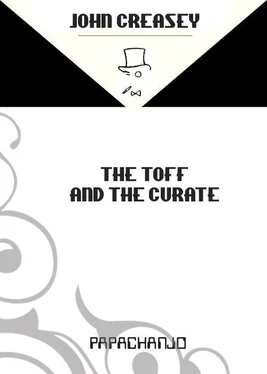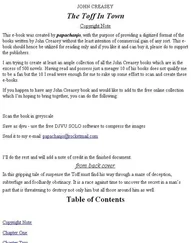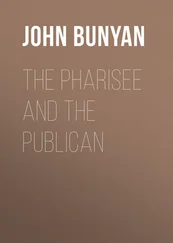John Creasey - The Toff And The Curate
Здесь есть возможность читать онлайн «John Creasey - The Toff And The Curate» весь текст электронной книги совершенно бесплатно (целиком полную версию без сокращений). В некоторых случаях можно слушать аудио, скачать через торрент в формате fb2 и присутствует краткое содержание. Жанр: Старинная литература, на русском языке. Описание произведения, (предисловие) а так же отзывы посетителей доступны на портале библиотеки ЛибКат.
- Название:The Toff And The Curate
- Автор:
- Жанр:
- Год:неизвестен
- ISBN:нет данных
- Рейтинг книги:5 / 5. Голосов: 1
-
Избранное:Добавить в избранное
- Отзывы:
-
Ваша оценка:
- 100
- 1
- 2
- 3
- 4
- 5
The Toff And The Curate: краткое содержание, описание и аннотация
Предлагаем к чтению аннотацию, описание, краткое содержание или предисловие (зависит от того, что написал сам автор книги «The Toff And The Curate»). Если вы не нашли необходимую информацию о книге — напишите в комментариях, мы постараемся отыскать её.
The Toff And The Curate — читать онлайн бесплатно полную книгу (весь текст) целиком
Ниже представлен текст книги, разбитый по страницам. Система сохранения места последней прочитанной страницы, позволяет с удобством читать онлайн бесплатно книгу «The Toff And The Curate», без необходимости каждый раз заново искать на чём Вы остановились. Поставьте закладку, и сможете в любой момент перейти на страницу, на которой закончили чтение.
Интервал:
Закладка:
“If you hadn’t, you wouldn’t have admitted him,” said Rollison. “But I doubt whether you could have kept him out. That young man is militant-minded and he seems to be getting a raw deal.”
“I expect he has invited it,” murmured Jolly, primly. “I can’t imagine the people near the docks taking kindly to being driven by a parson.”
“No. And he would try to drive,” mused Rollison. The journey took a little more than half an hour. On the last lap, Jolly had to direct the driver to Jupe Street, a narrow thoroughfare leading off Whitechapel Road. The Mission Hall was at the far end. They passed row upon row of mean houses and some bare patches and did not see any light until the taxi stopped. Then a streak of light from an open door shone right across an alleyway.
“Tell ‘em to put that light aht,” growled the driver. Rollison and Jolly hurried down the alley to the door and, as they drew nearer, they caught sight of Kemp standing just inside the room.
Jolly stood outside the door as Rollison went in.
Kemp must have heard him but did not turn round.
He was standing quite still, his chin thrust forward and his face set. He was looking at the wreckage of chairs and forms and benches, curtains and pictures. The hall was not a large one and at the far end was a stage with doors on either side; they were open and inside both rooms Rollison saw further upheaval. Whoever had been here had worked with frenzied malice. Most of the chairs were broken, the side walls had been daubed with white and brown paint and, on the wall behind the stage, written in badly-formed letters in red paint, were the words:
Clear out, Kemp. We don’t want yore kind ere.
CHAPTER TWO
EVIDENCE OF MALICE
“Who is that?” asked Kemp, without looking round. “Rollison,” said Rollison. “Oh.” The younger man turned slowly and looked into the Toff’s face. His own held a curiously drawn expression—as if the past hour had put years on to his life. “Someone doesn’t like me,” he said, harshly. “That can cut both ways,” said Rollison, lightly.
He wanted to see how the other would react and watched him carefully. After a long pause, during which his face was quite blank except for the glitter in his eyes, Kemp’s lips began to curve.
“You’re a good cure for depression,” he said, in a lighter voice. I was to have met two parishioners here. Instead, the door was open and, when I switched on the light, this is what I found. They’ve made a thorough job, haven’t they?”
“Not bad,” admitted Rollison, “but there isn’t much that can’t be repaired, as far as I can see, so perhaps they want to keep you busy. Who were the two people whom you expected to be waiting for you?”
“A Mr and Mrs Whiting,” Kemp said, absently. “Probably they got scared and I can’t blame them. I shouldn’t imagine I’m going to have many friends in the near future!” The edge was back in his voice as he proffered cigarettes. Rollison took one.
“You don’t know your people yet,” he said. “Those who were lukewarm towards you before will now rally round and people who’ve never set foot in the church will probably come in on your side. You’ve a chance in a thousand, if you’ll take it.”
Kemp looked at him incredulously.
“Are you serious?”
“Yes,” said Rollison, “I’ve been acquainted with these people for years and I don’t think you need worry about lacking friends—you can count on it that those who aren’t for you now are against you, which will be a help.” He stepped to the door and called Jolly, who entered without a change of expression; he bowed to Kemp. “Move around a bit, Jolly,” said Rollison, “and try to find out something about this. Freddie Day might have heard a whisper, or else—”
“I think I know whom to approach, sir,” said Jolly, faintly reproachful.
Rollison grinned. “So you should! If I’m not here when you’ve finished, I’ll leave a message.”
“Very good, sir.” Jolly went out and Kemp’s gaze followed him, as if he were too good to be true.
“Who is Eddie Day?” he asked.
“Freddie,” corrected Rollison. “He’s the manager of the pub on the corner of Jupe Street.”
Kemp frowned. “I don’t know the licensed victuallers.”
Rollison stared. “The—” he chuckled and went on jocularly: “If you call pub-keepers licensed victuallers, you’ll make your people think they’ve got to learn a new language—it would be easier for you to learn theirs!” When Kemp looked slightly shocked, he went on in a sharper voice: “The pubs are part of your parish, aren’t they?”
“Yes,” admitted Kemp, uncomfortably, “but I—er—I—I always thought—”
“That they were dens of vice and iniquity in the East End,” said Rollison. “Yes, I suppose you would but the quicker you get the idea out of your head, the better. You’ll find the good as well as the bad go regularly for their pint and if you try to make ‘em give it up, you’ll come a cropper. None of which is my business, strictly speaking,” he added, more lightly. “This job is. Have you got anything in mind?”
“I suppose I’d better tell the police,” said Kemp, slowly.
“Why such reluctance?”
“I didn’t get on with them very well before,” said Kemp. “I mean, about Craik.”
“If that were the only reason, I’d say go to see them,” said Rollison. “But it might be a good idea not to tell them yet. They’ll hear about it but unless you approach them officially, they’ll do nothing. If you ask them to investigate, they’ll probably start a round-up and they might pick up half a dozen of the people concerned but your stock would go down with a bump.”
“I wish I could understand you,” said Kemp, after a short pause.
“Taken by and large,” said Rollison, “East Enders don’t like the police. Oh, they rub shoulders and get along all right but it’s an uneasy peace. A man who runs to the police if he’s been beaten up or had his pocket picked doesn’t win much favour but if he finds out who does it and repays him in kind, that’s a different story.”
“Confound it, I can’t go round wrecking people’s homes!”
“Need you take me so literally?” asked Rollison. “Ever done any boxing, Kemp?”
“A bit, at Oxford,” Kemp answered.
“I thought you looked as if you could pack a punch.”
“I suppose you do realise that I’m—”
“A parson, yes. Is that any reason why you shouldn’t behave like a human being?” asked Rollison. “You want to get on top of this trouble and you want the people friendly, don’t you?”
Kemp said: “Yes.” He spoke with restraint, as if he had difficulty in preventing himself from saying just how badly he wanted both those things.
“Then give my way a trial,” advised Rollison. “You’ll soon find out if it flops.” He stepped forward towards the stage and looked at the writing thoughtfully, murmuring: “A nice taste in capitals. Now, let’s get busy,” he said more briskly. “It’s personal but it isn’t aimed at you because you’re Ronald Kemp, recently from Oxford and trying to muscle in on a new district. It’s because of something you’ve done or you want to do, which is upsetting someone’s applecart. Have you any ideas about it?”
“Not the faintest!”
“Try to think some up,” urged Rollison. “Go over everything that’s happened since you arrived and find out whose corns you’ve trodden on. What kind of reforms have you tried to start?” he added drily. “You haven’t seriously had a shot at turning the pagans teetotal, have you?”
“Great Scott, no! I don’t know that I’ve done anything that could offend anyone,” Kemp went on worriedly. “I’ve started one or two of the mission halls going again, there hadn’t been any meetings or social evenings for some time. And I’ve tried to step up the collection of old clothes for some of the poorer people. Do you think they resent that kind of charity?”
Читать дальшеИнтервал:
Закладка:
Похожие книги на «The Toff And The Curate»
Представляем Вашему вниманию похожие книги на «The Toff And The Curate» списком для выбора. Мы отобрали схожую по названию и смыслу литературу в надежде предоставить читателям больше вариантов отыскать новые, интересные, ещё непрочитанные произведения.
Обсуждение, отзывы о книге «The Toff And The Curate» и просто собственные мнения читателей. Оставьте ваши комментарии, напишите, что Вы думаете о произведении, его смысле или главных героях. Укажите что конкретно понравилось, а что нет, и почему Вы так считаете.












